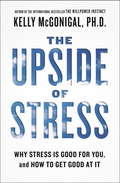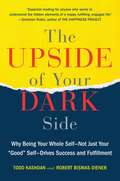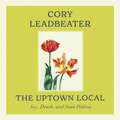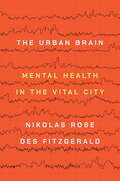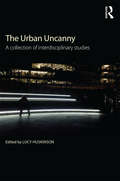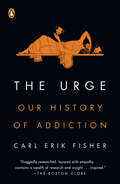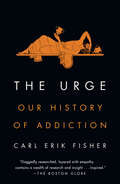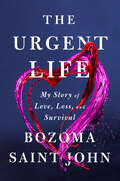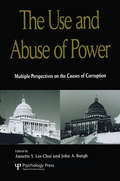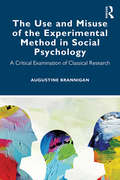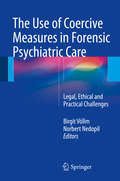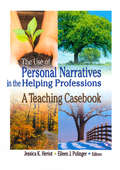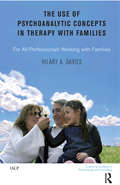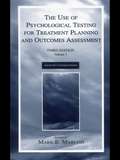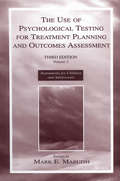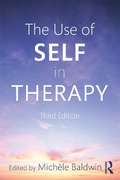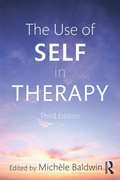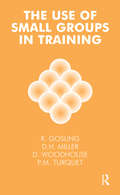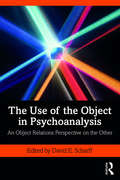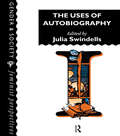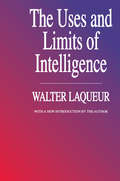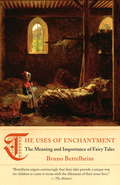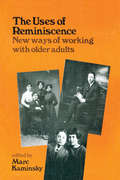- Table View
- List View
The Upside of Stress
by Kelly McgonigalThe author of The Willpower Instinct delivers a controversial and groundbreaking new book that overturns long-held beliefs about stress. More than forty-four percent of Americans admit to losing sleep over stress. And while most of us do everything we can to reduce it, Stanford psychologist and bestselling author Kelly McGonigal, Ph.D., delivers a startling message: Stress isn't bad. In The Upside of Stress, McGonigal highlights new research indicating that stress can, in fact, make us stronger, smarter, and happier--if we learn how to embrace it. The Upside of Stress is the first book to bring together cutting-edge discoveries on the correlation between resilience--the human capacity for stress-related growth--and mind-set, the power of beliefs to shape reality. As she did in The Willpower Instinct, McGonigal combines science, stories, and exercises into an engaging and practical book that is both entertaining and life-changing, showing you:how to cultivate a mind-set to embrace stresshow stress can provide focus and energyhow stress can help people connect and strengthen close relationshipswhy your brain is built to learn from stress, and how to increase its ability to learn from challenging experiences McGonigal's TED talk on the subject has already received more than 7 million views. Her message resonates with people who know they can't eliminate the stress in their lives and want to learn to take advantage of it. The Upside of Stress is not a guide to getting rid of stress, but a guide to getting better at stress, by understanding it, embracing it, and using it.From the Hardcover edition.
The Upside of Your Dark Side: Why Being Your Whole Self--Not Just Your "Good" Self--Drives Success and Fulfillment
by Todd Kashdan Robert Biswas-DienerTwo mavericks in the field of positive psychology deliver a timely message Happiness experts have long told us to tune out our negative emotions and focus instead on mindfulness, positivity, and optimism. Researchers Todd Kashdan, Ph.D., and Robert Biswas-Diener, Dr. Philos., disagree. Positive emotions alone are not enough. <P><P> Anger makes us creative, selfishness makes us brave, and guilt is a powerful motivator. The real key to success lies in emotional agility. Drawing upon extensive scientific research and a wide array of real-life examples, The Upside of Your Dark Side will be embraced by business leaders, parents, and everyone else who's ready to put their entire psychological tool kit to work. and a wide array of real-life examples including sports, the military, parenting, education, romance, business, and more, The Upside of Your Dark Side is a refreshing reality check that shows us how we can truly maximize our potential. <P>With an appreciation of our entire psychological toolkit, we become whole--which allows us to climb the highest peaks and handle the deepest valleys.
The Uptown Local: Joy, Death, and Joan Didion
by Cory LeadbeaterAs an aspiring novelist in his early twenties, Cory Leadbeater was presented with an opportunity to work for a well-known writer whose identity was kept confidential. Since the tumultuous days of childhood, Cory had sought refuge from the rougher parts of life in the pages of books. Suddenly, he found himself the personal assistant to a titan of literature: Joan Didion.In the nine years that followed, Cory shared Joan's rarefied world, transformed not only by her blazing intellect but by her generous friendship and mentorship. Together they recited poetry in the mornings, dined with Supreme Court justices, attended art openings, smoked a single cigarette before bed.But secretly, Cory was spiraling. He reeled from the death of a close friend. He spent his weekends at a federal prison, visiting his father as he served time for fraud. He struggled day after day to write the novel that would validate him as a real writer. And meanwhile, the forces of addiction and depression loomed large.In hypnotic prose that pulses with life and longing, The Uptown Local explores the fault lines of class, family, loss, and creativity. It is a love letter to a cultural icon-and a moving testament to the relationships that sustain us in the eternal pursuit of a life worth living.
The Uptown Local: Joy, Death, and Joan Didion
by Cory LeadbeaterAs an aspiring novelist in his early twenties, Cory Leadbeater was presented with an opportunity to work for a well-known writer whose identity was kept confidential. Since the tumultuous days of childhood, Cory had sought refuge from the rougher parts of life in the pages of books. Suddenly, he found himself the personal assistant to a titan of literature: Joan Didion.In the nine years that followed, Cory shared Joan's rarefied world, transformed not only by her blazing intellect but by her generous friendship and mentorship. Together they recited poetry in the mornings, dined with Supreme Court justices, attended art openings, smoked a single cigarette before bed.But secretly, Cory was spiraling. He reeled from the death of a close friend. He spent his weekends at a federal prison, visiting his father as he served time for fraud. He struggled day after day to write the novel that would validate him as a real writer. And meanwhile, the forces of addiction and depression loomed large.In hypnotic prose that pulses with life and longing, The Uptown Local explores the fault lines of class, family, loss, and creativity. It is a love letter to a cultural icon-and a moving testament to the relationships that sustain us in the eternal pursuit of a life worth living.
The Urban Brain: Mental Health in the Vital City
by Nikolas Rose Des FitzgeraldBridging the social and life sciences to unlock the mystery of how cities shape mental health and illnessMost of the world’s people now live in cities and millions have moved from the countryside to the rapidly growing megacities of the global south. How does the urban experience shape the mental lives of those living in and moving to cities today? Sociologists study cities as centers of personal progress and social innovation, but also exclusion, racism, and inequality. Psychiatrists try to explain the high rates of mental disorders among urban dwellers, especially migrants. But the split between the social and life sciences has hindered understanding of how urban experience is written into the bodies and brains of urbanites. In The Urban Brain, Nikolas Rose and Des Fitzgerald seek to revive the collaboration between sociology and psychiatry about these critical questions. Reexamining the relationship between the city and the brain, Rose and Fitzgerald explore the ways cities shape the mental health and illness of those who inhabit them.Drawing on the social and life sciences, The Urban Brain takes an ecosocial approach to the vital city, in which humans live and thrive but too often get sick and suffer. The result demonstrates what we can gain by a vitalist approach to the mental lives of those migrating to and living in cities, focusing on the ways that humans make, remake, and inhabit their urban lifeworlds.
The Urban Myths of Popular Modern Atheism: How Christian Faith Can Be Intelligent
by Paul E. HillHow Atheists rely on urban myths about religion to buttress their case against God. God, and the whole business of being dependent upon him, is being downgraded, downsized, downplayed, and most of all, just plain dismissed in the modern, cultured, educated parts of Europe and in academia. This process is powered and driven by a whole, growing series of interlocked urban myths about what is supposed to be involved in being a religious (and often specifically Christian) believer. This book examines and critiques those myths, showing how the Christian faith can be intelligent and supported by reason.
The Urban Uncanny: A collection of interdisciplinary studies
by Lucy HuskinsonThe Urban Uncanny explores through ten engaging essays the slippage or mismatch between our expectations of the city—as the organised and familiar environments in which citizens live, work, and go about their lives—and the often surprising and unsettling experiences it evokes. The city is uncanny when it reveals itself in new and unexpected light; when its streets, buildings, and people suddenly appear strange, out of place, and not quite right. Bringing together a variety of approaches, including psychoanalysis, historical and contemporary case study of cities, urban geography, film and literary critique, the essays explore some of the unsettling mismatches between city and citizen in order to make sense of each, and to gauge the wellbeing of city life more generally. Essays examine a number of cities, including Edmonton, London, Paris, Oxford, Las Vegas, Berlin and New York, and address a range of issues, including those of memory, death, anxiety, alienation, and identity. Delving into the complex repercussions of contemporary mass urban development, The Urban Uncanny opens up the pathological side of cities, both real and imaginary. This interdisciplinary collection provides unparalleled insights into the urban uncanny that will be of interest to academics and students of urban studies, urban geography, psychoanalysis, cultural studies, social studies and film studies, and to anyone interested in the darker side of city life.
The Urge: Our History of Addiction
by Carl Erik FisherAn authoritative, illuminating, and deeply humane history of addiction—a phenomenon that remains baffling and deeply misunderstood despite having touched countless lives—by an addiction psychiatrist striving to understand his own family and himself&“Carl Erik Fisher&’s The Urge is the best-written and most incisive book I&’ve read on the history of addiction. In the midst of an overdose crisis that grows worse by the hour and has vexed America for centuries, Fisher has given us the best prescription of all: understanding. He seamlessly blends a gripping historical narrative with memoir that doesn&’t self-aggrandize; the result is a full-throated argument against blaming people with substance use disorder. The Urge is a propulsive tour de force that is as healing as it is enjoyable to read.&”—Beth Macy, author of DopesickEven after a decades-long opioid overdose crisis, intense controversy still rages over the fundamental nature of addiction and the best way to treat it. With uncommon empathy and erudition, Carl Erik Fisher draws on his own experience as a clinician, researcher, and alcoholic in recovery as he traces the history of a phenomenon that, centuries on, we hardly appear closer to understanding—let alone addressing effectively. As a psychiatrist-in-training fresh from medical school, Fisher was soon face-to-face with his own addiction crisis, one that nearly cost him everything. Desperate to make sense of the condition that had plagued his family for generations, he turned to the history of addiction, learning that the current quagmire is only the latest iteration of a centuries-old story: humans have struggled to define, treat, and control addictive behavior for most of recorded history, including well before the advent of modern science and medicine. A rich, sweeping account that probes not only medicine and science but also literature, religion, philosophy, and public policy, The Urge illuminates the extent to which the story of addiction has persistently reflected broader questions of what it means to be human and care for one another. Fisher introduces us to the people who have endeavored to address this complex condition through the ages: physicians and politicians, activists and artists, researchers and writers, and of course the legions of people who have struggled with their own addictions. He also examines the treatments and strategies that have produced hope and relief for many people with addiction, himself included. Only by reckoning with our history of addiction, he argues—our successes and our failures—can we light the way forward for those whose lives remain threatened by its hold. The Urge is at once an eye-opening history of ideas, a riveting personal story of addiction and recovery, and a clinician&’s urgent call for a more expansive, nuanced, and compassionate view of one of society&’s most intractable challenges.
The Urge: Our History of Addiction
by Carl Erik FisherAn authoritative, illuminating, and deeply humane history of addiction—a phenomenon that remains baffling and deeply misunderstood despite having touched countless lives—by an addiction psychiatrist striving to understand his own family and himselfEven after a decades-long opioid overdose crisis, intense controversy still rages over the fundamental nature of addiction and the best way to treat it. With uncommon empathy and erudition, Carl Erik Fisher draws on his own experience as a clinician, researcher, and alcoholic in recovery as he traces the history of a phenomenon that, centuries on, we hardly appear closer to understanding—let alone addressing effectively. As a psychiatrist-in-training fresh from medical school, Fisher was soon face-to-face with his own addiction crisis, one that nearly cost him everything. Desperate to make sense of the condition that had plagued his family for generations, he turned to the history of addiction, learning that the current quagmire is only the latest iteration of a centuries-old story: humans have struggled to define, treat, and control addictive behavior for most of recorded history, including well before the advent of modern science and medicine. A rich, sweeping history that probes not only medicine and science but also literature, religion, philosophy, and sociology, The Urge illuminates the extent to which the story of addiction has persistently reflected broader questions of what it means to be human and care for one another. Fisher introduces us to the people who have endeavored to address this complex condition through the ages: physicians and politicians, activists and artists, researchers and writers, and of course the legions of people who have struggled with their own addictions. He also examines the treatments and strategies that have produced hope and relief for many people with addiction, himself included. Only by reckoning with our history of addiction, he argues—our successes and our failures—can we light the way forward for those whose lives remain threatened by its hold. The Urge is at once an eye-opening history of ideas, a riveting personal story of addiction and recovery, and a clinician&’s urgent call for a more expansive, nuanced, and compassionate view of one of society&’s most intractable challenges.
The Urgent Life: My Story of Love, Loss, and Survival
by Bozoma Saint John"The Urgent Life shines a bright light on the intricacies of the shadows she&’s been in, and illuminates the beauty of her urgent life.&” —Serena WilliamsFrom iconic leader Bozoma Saint John, comes a memoir of grief, and one woman's drive to thrive in the face of lossWhen Bozoma Saint John's husband, Peter, died of cancer, she made one big decision: to live life urgently. Bozoma was no stranger to adversity, having lost her college boyfriend to suicide, navigated an interracial marriage, grieved a child born prematurely--a process that led to her and Peter's separation--and coparented the daughter who she and Peter shared. When Peter knew his cancer was terminal, he gave Bozoma a short list of things to do: cancel the divorce, and fix the wrongs immediately. In The Urgent Life, Bozoma takes readers through the dizzying, numbing days of multiple griefs, and the courage which these sparked in her to live life in accordance with her deepest values time and time again. We witness Bozoma's journey forward through the highs and the lows, as she negotiates life as a woman determined to learn from tragedies to build a remarkable life worth living even in her brokenness.Bozoma's story is extraordinary, but her grief is not uncommon, and her courage is sure to touch any reader who has loved, mourned and is finding a path through loss and grief, as well as anyone who is maneuvering a pivot and wants to live life to its fullest.
The Use and Abuse of Power
by John A. Bargh Annette Y. Lee-ChaiA compilation of works from prominent researchers, promoting both a panoramic and multilevel understanding of this complex construct, with focus on power as a cause of social ills and remedies to prevent corruption and abuse.
The Use and Misuse of the Experimental Method in Social Psychology: A Critical Examination of Classical Research
by Augustine BranniganThis book critically examines the work of a number of pioneers of social psychology, including legendary figures such as Kurt Lewin, Leon Festinger, Muzafer Sherif, Solomon Asch, Stanley Milgram, and Philip Zimbardo. Augustine Brannigan argues that the reliance of these psychologists on experimentation has led to questions around validity and replication of their studies. The author explores new research and archival work relating to these studies and outlines a new approach to experimentation that repudiates the use of deception in human experiments and provides clues to how social psychology can re-articulate its premises and future lines of research. Based on the author’s 2004 work The Rise and Fall of Social Psychology, in which he critiques the experimental methods used, the book advocates for a return to qualitative methods to redeem the essential social dimensions of social psychology. Covering famous studies such as the Stanford Prison Experiment, Milgram’s studies of obedience, Sherif's Robbers Cave, and Rosenhan's exposé of psychiatric institutions, this is essential and fascinating reading for students of social psychology, and the social sciences. It’s also of interest to academics and researchers interested in engaging with a critical approach to classical social psychology, with a view to changing the future of this important discipline.
The Use of Coercive Measures in Forensic Psychiatric Care
by Birgit Völlm Norbert NedopilThis book presents the legal context and describes the ethical and practical challenges when using coercive measures in forensic psychiatric settings. A wide range of aspects relevant to the use of such measures, including environmental, patient-related, and staff-related factors, are explored, and the experience of coercive interventions is described from the staff and the patient perspective. Differences in jurisdictions and examples of good practice are highlighted. The authors are from a range of professional backgrounds, ensuring breadth as well as depth in discussion of the topic. The use of coercive measures, in particular restraint, seclusion, and involuntary medication, for the control of aggression in psychiatry remains controversial. Forensic mental health care deals with individuals who pose a risk to others and often present with significant management problems within institutions. The care of patients in these settings gives rise to debates about the balance between care and safety, and between the interests of the patients and those of the wider society to be protected. Despite these tensions, limited research has been conducted specifically on the use of coercive measures in forensic mental health care. This volume aims to fill the gap and will be of value to all professionals working in forensic psychiatric settings as well as to those working in general psychiatric and custodial settings, law professionals, and patients.
The Use of Personal Narratives in the Helping Professions: A Teaching Casebook
by Jessica K Heriot Eileen J PolingerUse these fascinating first-person accounts to bring real-world problems into the classroom!The Use of Personal Narratives in the Helping Professions: A Teaching Casebook is a collection of personal narratives, short stories, and poetry about mental illness and other life-affecting problems, mostly in the context of family life. Each selection is accompanied by questions for discussion; selected reading lists are provided with each chapter. Beginning with problems related to childhood, the stories range through adolescence, adulthood, and old age. This unique book provides students and educators in psychology, social work, and counseling with an in-depth understanding of various mental illnesses and psychosocial problems through the life cycle. Its stories and narratives give students the unique opportunity to experience “from the inside” what it is like to live with an eating disorder or struggle with a compulsion phobia. The Use of Personal Narratives in the Helping Professions is more than a teaching tool. These stories are more than thought provoking, more than simply insightful. They are truly fascinating--each a candid, no-holds-barred glimpse into the personal reality of its narrator--and will inspire the kind of discussions that the best courses and instructors are remembered for. Your students will most likely have finished the book before the class has finished discussing the first chapter! With The Use of Personal Narratives in the Helping Professions, your students will explore: family relationships under various types of stress how families cope with physical illness what happens to the family when a loved one struggles with mental illness the impact of racial issues the effects of sexual abuse and domestic violence the process of healing from childhood trauma . . . and much more!The Use of Personal Narratives in the Helping Professions provides first-hand knowledge of what the loss of a parent to death, mental illness, or alcoholism feels like to the child; of how ”coming out” as a lesbian affects one's life; of the love and frustration of having a mentally handicapped sibling; of what it's like to lose one's memory in old age. No academic description can convey the feelings, meaning, and effects on the individual or family of mental illness or other psychosocial stressors. Only narratives and stories based on direct experience--exactly what you'll find in The Use of Personal Narratives in the Helping Professions--can offer this perspective.
The Use of Psychoanalytic Concepts in Therapy with Families: For all Professionals Working with Families (United Kingdom Council For Psychotherapy Ser.)
by Hilary A. DaviesThis book begins with a readable practitioner’s guide to psychoanalytic theory and concepts. It moves on to give a number of detailed practice-based examples of the application of this theoretical model in the therapy room with the families of children seeking help with a variety of difficulties. The ideas are presented as an enhancement, and not an alternative, to the different styles and schools of therapy with families, and aim at enriching and broadening both the therapist’s thinking and practice skills. The examples include: children who have suffered emotional harm, young children whose behaviour can be violent, feeding difficulties, anorexia nervosa, somatic presentations, and children whose separated parents are in conflict. The author writes clearly and enthusiastically on the important possibilities that this way of thinking can bring to therapists’ work with families.
The Use of Psychological Testing for Treatment Planning and Outcomes Assessment: Volume 1: General Considerations
by Mark E. MaruishTest-based psychological assessment has been significantly affected by the health care revolution in the United States during the past two decades. Despite new limitations on psychological services across the board and psychological testing in particular, it continues to offer a rapid and efficient method of identifying problems, planning and monitoring a course of treatment, and assessing the outcomes of interventions.This thoroughly revised and greatly expanded third edition of a classic reference, now three volumes, constitutes an invaluable resource for practitioners who in a managed care era need to focus their testing not on the general goals of personality assessment, symptom identification, and diagnosis so often presented to them as students and trainees, but on specific questions: What course of treatment should this person receive? How is it going? Was it effective? New chapters describe new tests and models and new concerns such as ethical aspects of outcomes assessment. Volume I reviews general issues and recommendations concerning the use of psychological testing for screening for psychological disturbances, planning and monitoring appropriate interventions, and the assessing outcomes, and offers specific guidelines for selecting instruments. It also considers more specific issues such as the analysis of group and individual patient data, the selection and implementation of outcomes instrumentation, and the ethics of gathering and using outcomes data. Volume II discusses psychological measures developed for use with younger children and adolescents that can be used for the purposes outlined in Volume I; Volume III, those developed for use with adults.Drawing on the knowledge and experience of a diverse group of leading experts--test developers, researchers, clinicians and others, the third edition of The Use of Psychological Testing for Treatment Planning and Outcomes Assessment provides vital assistance to all clinicians, and to their trainees and graduate students.
The Use of Psychological Testing for Treatment Planning and Outcomes Assessment: Volume 2: Instruments for Children and Adolescents
by Mark E. MaruishTest-based psychological assessment has been significantly affected by the health care revolution in the United States during the past two decades. Despite new limitations on psychological services across the board and psychological testing in particular, it continues to offer a rapid and efficient method of identifying problems, planning and monitoring a course of treatment, and assessing the outcomes of interventions.This thoroughly revised and greatly expanded third edition of a classic reference, now three volumes, constitutes an invaluable resource for practitioners who in a managed care era need to focus their testing not on the general goals of personality assessment, symptom identification, and diagnosis so often presented to them as students and trainees, but on specific questions: What course of treatment should this person receive? How is it going? Was it effective? New chapters describe new tests and models and new concerns such as ethical aspects of outcomes assessment. Volume I reviews general issues and recommendations concerning the use of psychological testing for screening for psychological disturbances, planning and monitoring appropriate interventions, and the assessing outcomes, and offers specific guidelines for selecting instruments. It also considers more specific issues such as the analysis of group and individual patient data, the selection and implementation of outcomes instrumentation, and the ethics of gathering and using outcomes data. Volume II discusses psychological measures developed for use with younger children and adolescents that can be used for the purposes outlined in Volume I; Volume III, those developed for use with adults.Drawing on the knowledge and experience of a diverse group of leading experts--test developers, researchers, clinicians and others, the third edition of The Use of Psychological Testing for Treatment Planning and Outcomes Assessment provides vital assistance to all clinicians, and to their trainees and graduate students.
The Use of Self in Therapy
by Michèle BaldwinOne of the most powerful factors in therapy is that it involves the intensive relationship between two (or more) human beings. The issues of transparency and self-disclosure therefore become important concerns for therapists; how can they use themselves effectively in their work without transgressing on professional regulations? These issues and concerns are addressed in this new edition of The Use of Self in Therapy by experienced therapists, who share their own wisdom, research, and experiences in valuable ways. Disregarding methodology or approach, the authors demonstrate how to train and develop the self and person of the therapist as a powerful adjunct to successful therapy. They enable practitioners to become more effective in helping their clients to realize and regain their own powers of healing and healthy recovery. This 3rd edition also examines the impact of increasing professional regulation, as well as the impact of the internet and social media on the conduct of therapy. Also new to this edition are discussions of how therapists can use themselves in cultures that are less individually-oriented. This book is a valuable addition to any therapist’s library and therapy supervisor’s teaching arsenal.
The Use of Self in Therapy,Third Edition
by Michele BaldwinThe authors in the book demonstrate how to train and develop the self and person of the therapist as a powerful adjunct to successful therapy.
The Use of Small Groups in Training
by Robert GoslingThis book describes the experiences of the Family Discussion Bureau in setting up short residential training courses for social case workers. It discusses that a psychiatrist can use small group methods as a vehicle for making institutional personnel from the penal system receptive to new ideas.
The Use of the Object in Psychoanalysis: An Object Relations Perspective on the Other
by David E. ScharffUsing Winnicott’s classic paper as its starting point, this fascinating collection explores a range of clinical and theoretical psychoanalytic perspectives around relating to "the object." Each author approaches the topic from a different angle, switching among the patient’s use of others in their internal and external lives, their use of their therapist, and the therapist’s own use of their patients. The use of objects is susceptible to wide interpretation and elaboration; it is both a normal phenomenon and a marker for certain personal difficulties, or even psychopathologies, seen in clinical practice. While it is normal for people to relate to others through the lens of their internal objects in ways that give added meaning to aspects of their lives, it becomes problematic when people live as if devoid of a self and instead live almost exclusively through the others who form their internal worlds, often leading them to feel that they cannot be happy until and unless others change. Assessing the significance of objects among adult and child patients, groups and the group-as-object, and exploring Freud’s own use of objects, The Use of the Object in Psychoanalysis will be of significant interest both to experienced psychoanalysts and psychotherapists and to trainees exploring important theoretical questions.
The Uses Of Autobiography
by Julia SwindellsFirst Published in 1995. Routledge is an imprint of Taylor & Francis, an informa company.
The Uses and Limits of Intelligence
by Walter LaqueurThis is a major survey and assessment of U.S. intelligence activities over the last forty-five years. It offers a systematic and authoritative evaluation of American intelligence-gathering machinery: how it has been used, misused, and on occasion, ignored. The book has been hailed as "a splendid work, reflective and penetrating" by James R. Schlesinger; while Zbigniew Brzezinski describes Laqueur as "a man who understands the relationships between history and the world of secret services." Henry S. Rowen noted that Laqueur "brings a rare degree of analytical power to this important subject."
The Uses of Enchantment: The Meaning and Importance of Fairy Tales (Peregrine Bks.)
by Bruno BettelheimBruno Bettelheim was one of the great child psychologists of the twentieth century and perhaps none of his books has been more influential than this revelatory study of fairy tales and their universal importance in understanding childhood development.<P><P> Analyzing a wide range of traditional stories, from the tales of Sindbad to “The Three Little Pigs,” “Hansel and Gretel,” and “The Sleeping Beauty,” Bettelheim shows how the fantastical, sometimes cruel, but always deeply significant narrative strands of the classic fairy tales can aid in our greatest human task, that of finding meaning for one’s life.<P> Winner of the National Book Award
The Uses of Reminiscence: New Ways of Working With Older Adults
by Mark KaminskyThe meaning and value of reminiscence in the lives of elders is beautifully explored.
